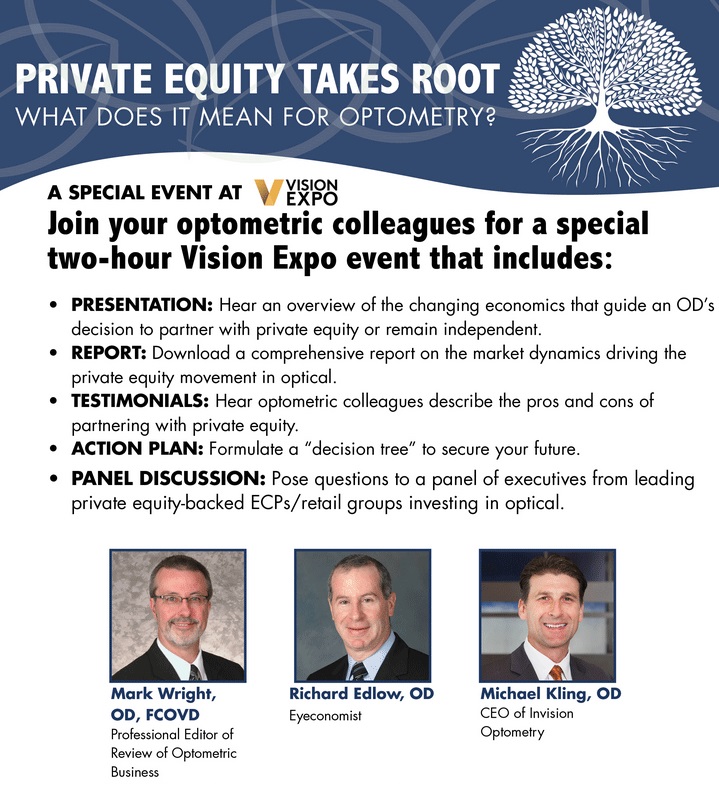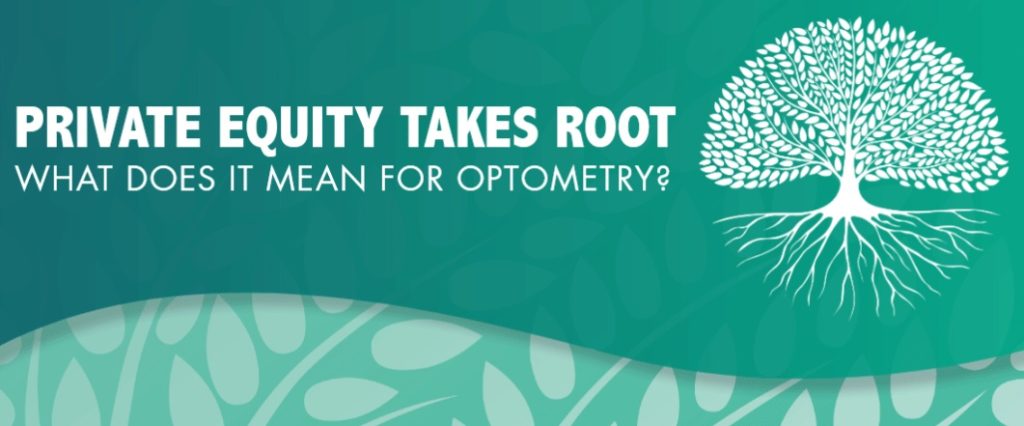By Ken Krivacic, OD, MBA

August 15, 2018
There has been a lot in the press lately about private equity firms buying optometric offices. As someone who has been in private practice for over 30 years, I don’t find the prospects of selling to a private equity firm appealing.
Here’s what’s good and bad about private equity, from my perspective, and why, after looking at the pros and cons, I’ve come down on the side of not selling.
The Advantages of Private Equity
Understandably, private equity finds optometry attractive on a number of fronts. For the most part, we are a recession-proof business, making us a stable business to invest in. In general, optometric revenues do not swing wildly like some other industries might through strong and weak economies.
Also, private equity firms seem to feel that putting processes and systems into place would make most optometry practices more efficient, more profitable, and therefore, they could easily reap a profit once they turnaround and sell the practice.
From an optometrist’s viewpoint, selling to a private equity firm has its positives. Generally, private equity will pay more for your practice than you would get by selling to another OD. If we get very generic, the average optometric practice will sell for about 60 percent of gross revenue to another OD.
According to Brian Chou, OD, a leading authority on private equity, and one who sold his practice to a private equity firm last year, the average sale price to private equity is sometimes over 100 percent of gross revenue. This makes it more appealing to optometrists who are ready to retire, or who no longer care to manage the business side of running an optometric practice.
Why It’s Not for Me
So why not sell? For me, there are two main reasons that I would not sell my practice. These involve economics and loss of control and purpose. Let’s tackle the economic issue first.
Let’s assume in this example we have a practice that is bringing in revenues of $1 million per year. My situation is close to that. I also want to practice another 10 years. Should I just keep doing what I’m doing or sell to private equity? Let’s do some simple math for the two scenarios.
Scenario 1: Sell to private equity
Sale of practice: $1,000,000 (assume sale price of 100 percent revenue)
New salary: $100,000 per year (total $1 million over 10 years)
Total earnings: $2,000,000 over next 10 years
Scenario 2: Continue to work for next 10 years
Sale of practice $0
Current salary $250,000 (assume 25 percent net per year over next 10 years)
Total earnings: $2,500,000
In looking at the options with a simple projection that does not include taxes, interest, depreciation and amortization, the option of just owning the practice outweighs the option of selling. At the same time, I could still sell the practice at the end of 10 years to another OD or to a private equity firm.
Loss of Control & Loss of Purpose
The second argument I have against selling to private equity involves loss of control and loss of purpose. This argument to me is more important than the economic one. One of the reasons I like being in private practice is that I am my own boss. Being a private practice owner allows you to set your own hours, buy the equipment you want, hire the staff you want, use the brands of contact lenses or frames you want, and in general, just be in control.
Once you sell to a private equity firm you become an employee, and therefore, must abide by your employer’s wants and needs. After operating the way I have for over 30 years, I believe it would be difficult for me to become an employee.
It may not be for everyone, but I enjoy the business/management side of running an optometric practice. Is it difficult? Yes. Are there days when I can’t wait to get home? Yes. Yet for me, the pluses outweigh the minuses. There is a sense of pride in seeing an optometric practice grow every year. There is a sense of pride when a patient tells you that you have a well-run office. There is a sense of pride when an employee says they want to apply to optometry school.
All these things may not benefit me financially, but they benefit me by giving a greater purpose to what I do every day. It’s examples like these that make me want to keep doing what I am doing, and in the manner that I am doing it, without someone telling me how I should do it.
I enjoy the challenge of running an optometric practice. It is not easy, but when things go right, it’s rewarding both economically, and from a sense-of-purpose standpoint.
I’m going to keep doing what I’m doing for another 10 years. How about you?
Have you sold to private equity? Are you considering it? From your own point of view, what are the advantages, and disadvantages, of selling to PE?
 Ken Krivacic, OD, MBA, owns Las Colinas Vision Center in Irving, Texas. To contact him: kkrivacic@aol.com.
Ken Krivacic, OD, MBA, owns Las Colinas Vision Center in Irving, Texas. To contact him: kkrivacic@aol.com.





























